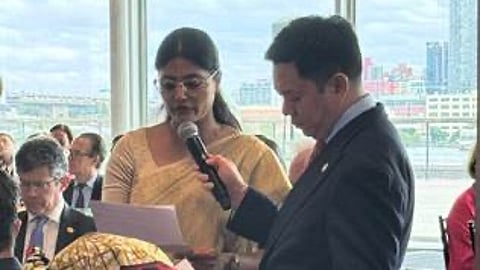

Union Minister of State for Health and Family Welfare, Smt. Anupriya Singh Patel, recently addressed a high-level side event at the United Nations, centered on the theme “Revitalized Multilateralism: Recommitting to Ending AIDS Together.” Organized by UNAIDS, the Global Fund, and PEPFAR, this event provided an opportunity for global leaders to reaffirm their commitment to the goal of ending HIV/AIDS as a public health threat.
During her speech, Smt. Patel underscored India’s dedication to achieving the United Nations’ Sustainable Development Goal (SDG) of eradicating HIV/AIDS by 2030. She emphasized the progress made under the National AIDS and STD Control Programme, now in its 5th phase (2021-2026), which is fully funded by the Indian government. Highlighting data from the India HIV Estimations 2023 report, the Minister noted that over 2.5 million people are currently living with HIV in India. However, due to sustained efforts, the adult HIV prevalence has been contained at 0.2%, with annual new infections estimated at around 66,400. Since 2010, new HIV infections have decreased by 44% in India, outperforming the global reduction rate of 39%.
India has implemented a range of innovative programs to combat HIV/AIDS, including initiatives that specifically target youth. Among these efforts are the Red Ribbon Clubs in educational institutions and the annual RED RUN Marathon, both designed to increase awareness and engagement. These programs have been successful in mobilizing young people and spreading knowledge about prevention and care for HIV/AIDS.
Smt. Patel also highlighted India's comprehensive HIV and Syphilis testing services for pregnant women, with over 30 million free HIV tests being conducted annually. Additionally, more than 1.7 million people in India receive free Anti-retroviral Therapy (ART) through the public health system, ensuring access to life-saving treatments.
Furthermore, India’s role as the world’s largest supplier of anti-retroviral drugs was another point of pride for the Minister. The country currently supplies over 70% of global anti-retroviral medicines, making treatment more affordable and accessible to nations in need. "We are proud to contribute to the global fight against HIV/AIDS by making quality treatment accessible worldwide," Patel said, underscoring India’s commitment to global health.
Efforts to reduce the stigma surrounding HIV have also been a key focus for India. Smt. Patel cited the HIV and AIDS (Prevention and Control) Act 2017, which mandates that all Indian states appoint ombudsmen to handle grievances and promote HIV prevention policies. India’s integrated approach to addressing co-morbidities, such as tuberculosis, viral hepatitis, and non-communicable diseases, has also helped improve the quality of care for people living with HIV.
In closing, Smt. Patel called for continued global cooperation, stating, "Breaking silos and building synergies is the mantra of the Government of India. Through collaboration, we will strengthen the fight against HIV/AIDS and build a healthier world for all." India remains steadfast in its mission to end HIV/AIDS by 2030, leveraging partnerships and a renewed commitment to multilateralism to reach this goal.
(Input from various sources)
(Rehash/Ankur Deka/MSM)
